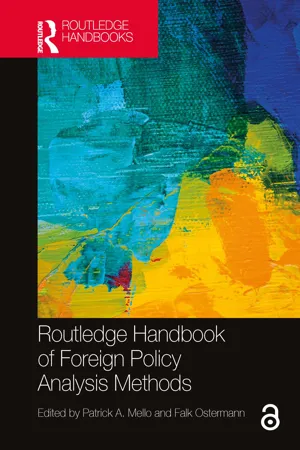
Routledge Handbook of Foreign Policy Analysis Methods
- 576 pages
- English
- ePUB (mobile friendly)
- Available on iOS & Android
Routledge Handbook of Foreign Policy Analysis Methods
About This Book
The disintegration and questioning of global governance structures and a re-orientation toward national politics combined with the spread of technological innovations such as big data, social media, and phenomena like fake news, populism, or questions of global health policies make it necessary for the introduction of new methods of inquiry and the adaptation of established methods in Foreign Policy Analysis (FPA). This accessible handbook offers concise chapters from expert international contributors covering a diverse range of new and established FPA methods. Embracing methodological pluralism and a belief in the value of an open discussion about methods' assumptions and diverging positions, it provides new, state-of-the-art research approaches, as well as introductions to a range of established methods. Each chapter follows the same approach, introducing the method and its development, discussing strengths, requirements, limitations, and potential pitfalls while illustrating the method's application using examples from empirical research. Embracing methodological pluralism and problem-oriented research that engages with real-world questions, the authors examine quantitative and qualitative traditions, rationalist and interpretivist perspectives, as well as different substantive backgrounds. The book will be of interest to a wide range of scholars and students in global politics, foreign policy, and methods-related classes across the social sciences.
Chapters 4, 25 and 32 of this book are available for free in PDF format as Open Access from the individual product page at www.routledge.com. It has been made available under a Creative Commons Attribution-Non Commercial-No Derivatives 4.0 license.
Frequently asked questions
Information
Table of contents
- Cover
- Half Title
- Title Page
- Copyright Page
- Contents
- List of Figures
- List of Tables
- List of Contributors
- Foreword: The Conduct of Inquiry in Foreign Policy Analysis
- Acknowledgments
- PART I
- Introduction
- Part II
- Perspectives on Foreign Policy
- PART III
- Language and Interpretive Methods
- PART IV
- Psychology, Roles, and Leaders
- PART V
- Quantitative and Comparative Approaches
- PART VI
- Qualitative Methods and Historical Approaches
- PART VII
- New Technology, Social Media, and Networks
- Index